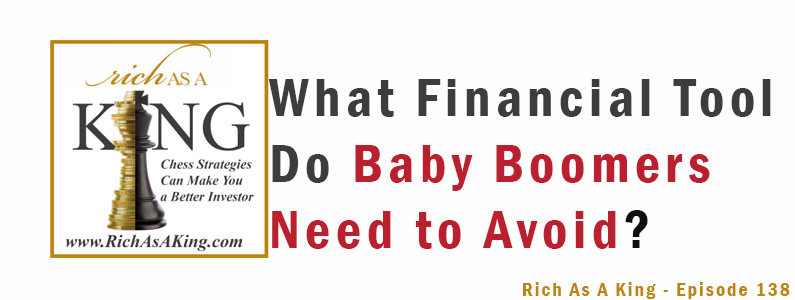
by Douglas Goldstein | May 30, 2017 | Financial Plan, Podcasts |
As baby boomers get closer to retirement, what’s the financial tool they should avoid? Find out why it’s important to line up your assets as your retirement approaches, just like a chess player who lines up his pieces and refines his endgame. Is it a good idea to take on a mortgage as you approach... Click for more

by Doug Goldstein CFP® | May 23, 2017 | Financial Plan |
When did you last review your finances? I’m not referring to checking to see how much cash is in your wallet, but a comprehensive review including your retirement plan, investments, and bank statements. Just like a chess player constantly reviews tactics and strategies in hopes of improving his game, it’s important to review your financial situation on a regular basis to improve your investment performance. By keeping up to date with what’s going on with your money, you can make real-time adjustments as the market and your personal circumstances change. One of my most popular blogposts, “Why You Need to Review Your Financial Plan”, discusses the importance of regular financial reviews. This blogpost is still as relevant today as when it was just published. Click here to read it and find out why conducting a financial review on a regular basis is so important! Douglas Goldstein, co-author of Rich As A King: How the Wisdom of Chess Can Make You A Grandmaster of Investing, is an avid chess fan, international investment advisor and Certified Financial Planner (CFP®).... Click for more
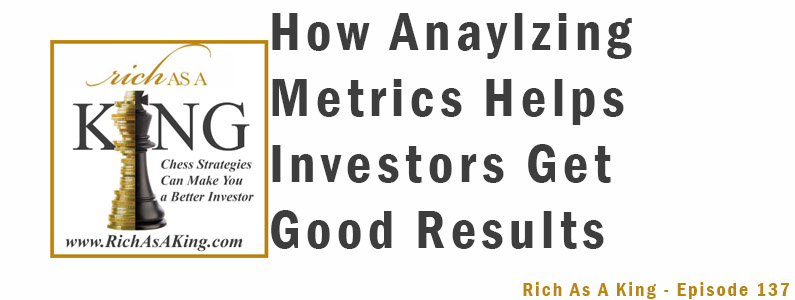
by Douglas Goldstein | May 16, 2017 | Decision Making, Podcasts, Strategic Thinking |
When playing chess and investing, it’s a good idea to measure your results by looking at performance metrics. But why are metrics important? Find out how measuring performance improves efficiency. If you can measure it, you can improve it! This financial podcast also discusses literacy and its connection with improved living standards in many parts of the... Click for more

by Doug Goldstein CFP® | May 9, 2017 | Chess |
Some of the world’s best chess players learned how to play when they were very young. The youngest person so far to become a grandmaster is Sergey Karjakin of Ukraine, who won the title at the age of 12 in 2002. In the same way that your child can become a good chess player if he learns the game at a young age, he can also become good at investing and managing his money if he begins learning basic financial concepts when he is very small. Why? What makes a child a strong chess player? You don’t have to be a genius to learn to play chess. Anyone with enough practice and skills can learn to play a good game of chess. However, a young child can absorb the necessary techniques and skills quicker than someone older, whose habits and mindset are already ingrained. Children may also be more enthusiastic about challenges and winning games than adults, giving them the push to learn more. If you give your child chess instruction at a very young age, what will happen? If he enjoys playing chess and develops his abilities, he may become a chess grandmaster. But even if he doesn’t play in chess tournaments or win any prizes, he will develop strategic thinking skills that will benefit him later on in life, whether in the classroom, at work, or in his personal life. The same idea applies to finance In the same way that a child can pick up chess skills more easily than an older person, it is easier to learn positive financial habits when still young rather than... Click for more
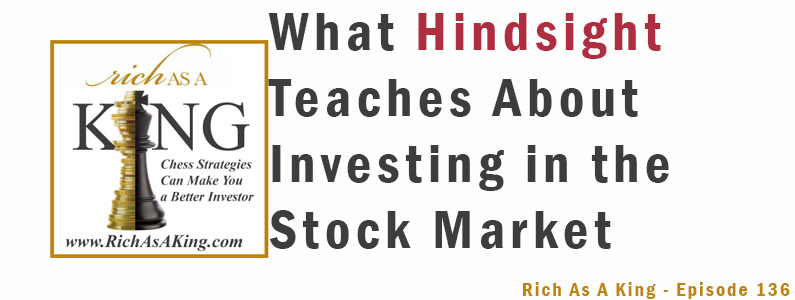
by Douglas Goldstein | May 2, 2017 | Decision Making, Financial Plan, Podcasts |
One of the reasons investing in the stock market is so difficult is because we can’t predict the future. The trick is to use hindsight to help you determine what will be. While past performance is never a guarantee of future results, if you were able to invest in the stock market 50 years ago, would it have been a worthwhile investment? Take a look at how the world’s economy and standard of living have developed over the past 50 years. When deciding where and how to invest, it’s important to look at the market’s potential and not only at its past. Looking at the potential of every country’s economy is just like how a chess player examines the potential of every... Click for more

by Doug Goldstein CFP® | Apr 25, 2017 | Chess, Financial Strategies |
When you play chess, you need to take small steps to success rather than making grandiose moves or waiting for your opponent’s blatant blunders. A good chess player builds his defensive and offensive fortress slowly, accumulating small advantages wherever possible. The same idea applies to finance. Since it’s unlikely that you will win enough money in the lottery to support you forever, you’ll need to accrue money in reasonable, steady amounts. Over time, a collection of seemingly trivial sums adds up. The book Rich As A King: How the Wisdom of Chess Can Make You a Grandmaster of Investing suggests the following small steps to help you build your nest egg. (To watch a 3-minute video about this, click here.): Regular savings. Squirrel away $5 per day, and put it into a stock mutual fund monthly or quarterly over twenty years. If you net 6% per year on that pool of money, you’ll end up with over $67,000. (If you can save even more, great!) Lower fees and expenses. Look for ways to reduce small, recurring cash outlays. You could transfer your banking relationship to a lower-priced firm (saving $400 per year), pay off your credit card every month (or better yet, switch to a debit card) and save $2,000 per year in interest payments, and renegotiate your cable and cell phone bills (save $30 per month). Examine your budget to find other possible savings routes. Implementing these alone would allow you to sock away $3,800 every year. Get a better salary or find a second income. Could you find a job with a better salary, or perhaps work... Click for more
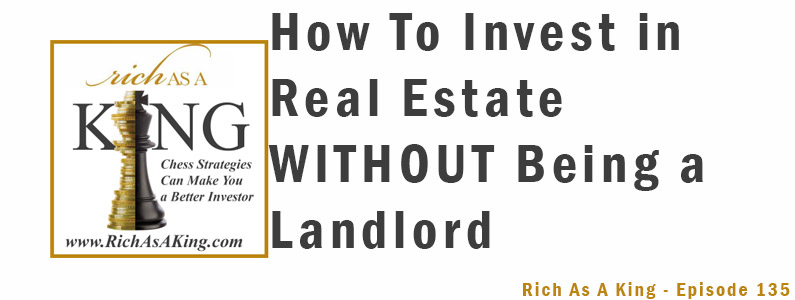
by Douglas Goldstein | Apr 19, 2017 | Asset Allocation, Podcasts |
Real estate investors hope to get a quick return on their initial purchase. While multi-millionaires are often real estate moguls, is this a good investing strategy for the ordinary person? Regular folks don’t realize what being a landlord entails or the time-consuming and expensive problems that may arise. On this financial podcast, find out how to invest in real estate without having to be a landlord. Even more importantly, learn to diversify your real estate investments. Also, get a free tool to help you work out your STRATegic... Click for more
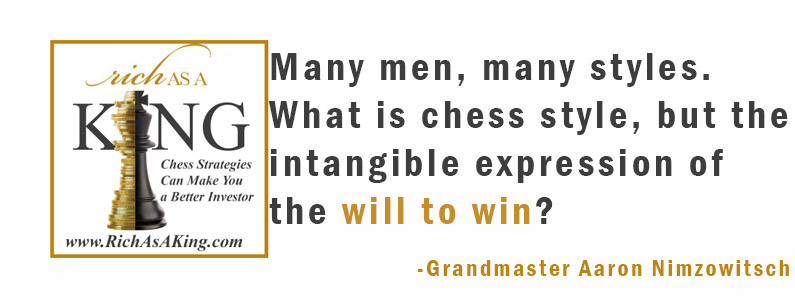
by Doug Goldstein CFP® | Apr 13, 2017 | Chess Strategies, Decision Making, Inspirational Quotes |
What makes a player win in chess? Is there a special, secret formula that always guarantees victory? As chess is a multifaceted game, there’s no one uniform tactic or strategy that works for every single player all the time. Every player has his or her own unique style of play. What works for one player may not work as well for another. However, despite their differences, people who win in chess have one thing in common. What is it? The secret ingredient to make you win Grandmaster Aaron Nimzowitsch said, “Many men, many styles. What is chess style, but the intangible expression of the will to win?” In other words, it’s not enough to memorize dozens of possible chess moves. You need to have the will and determination to win the game. Chances are that in any single game you lose several valuable pieces along the way, and you’ll have to change strategies mid-game. But if you‘re determined and believe you can win, you won’t give up, and will play the game to its end. The will to win also helps you succeed in finance The financial world is similar to the chessboard. While it’s obviously harder to get on your feet after sustaining a financial loss than it is to restart a failed game of chess, you still need the will to win to become a successful investor. The market may have its ups and downs, but don’t give up. If you are determined to “win,” (read: prepare for a financially successful life) you need to keep reassessing your investing strategies and tactics as you go along. As... Click for more












